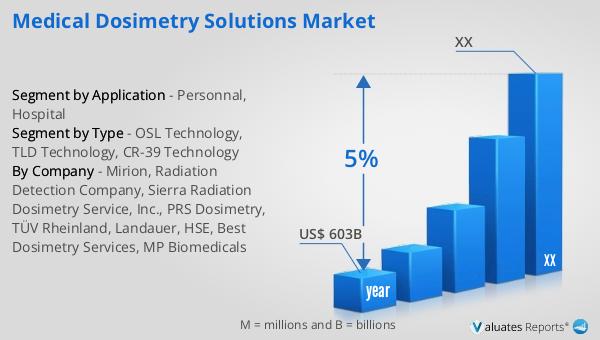What is Global Medical Dosimetry Solutions Market?
The Global Medical Dosimetry Solutions Market refers to the worldwide industry focused on the development, production, and distribution of dosimetry solutions used in medical settings. Dosimetry is the measurement, calculation, and assessment of ionizing radiation doses absorbed by the human body, particularly in the context of medical treatments such as radiotherapy for cancer patients. These solutions are crucial for ensuring that patients receive the correct dose of radiation, minimizing the risk of overexposure and potential side effects while maximizing the therapeutic benefits. The market encompasses a variety of technologies and products, including dosimeters, software for dose calculation, and services for dose monitoring and management. It serves a broad range of end-users, including hospitals, clinics, and research institutions, and is driven by the increasing prevalence of cancer, advancements in radiation therapy techniques, and the growing emphasis on patient safety and treatment efficacy. The market is characterized by continuous innovation and technological advancements aimed at improving the accuracy, efficiency, and user-friendliness of dosimetry solutions.

OSL Technology, TLD Technology, CR-39 Technology in the Global Medical Dosimetry Solutions Market:
Optically Stimulated Luminescence (OSL) Technology, Thermoluminescent Dosimetry (TLD) Technology, and CR-39 Technology are three prominent methods used in the Global Medical Dosimetry Solutions Market. OSL Technology involves the use of materials that emit light when exposed to ionizing radiation and subsequently stimulated by light. This emitted light is measured to determine the radiation dose. OSL dosimeters are known for their high sensitivity, wide dose range, and reusability, making them suitable for various medical applications, including patient and personnel monitoring. TLD Technology, on the other hand, uses materials that store energy when exposed to radiation and release it as light upon heating. The intensity of the emitted light is proportional to the absorbed dose, allowing for accurate dose measurement. TLD dosimeters are widely used due to their ability to measure a broad range of doses, stability over time, and suitability for both personal and environmental monitoring. CR-39 Technology employs a type of plastic polymer that forms tracks when exposed to ionizing radiation. These tracks are then chemically etched and counted to determine the radiation dose. CR-39 dosimeters are particularly valued for their high accuracy, durability, and ability to measure high doses, making them ideal for applications in high-radiation environments such as radiotherapy. Each of these technologies has its unique advantages and is chosen based on specific requirements and conditions of use. The integration of these technologies into dosimetry solutions enhances the precision and reliability of radiation dose measurements, contributing to improved patient safety and treatment outcomes.
Personnal, Hospital in the Global Medical Dosimetry Solutions Market:
The usage of Global Medical Dosimetry Solutions Market in personal and hospital settings is extensive and multifaceted. In personal settings, dosimetry solutions are primarily used for monitoring the radiation exposure of healthcare workers, ensuring their safety and compliance with regulatory limits. Personal dosimeters, often worn as badges or rings, continuously measure and record the radiation dose received by individuals working in environments with potential radiation exposure, such as radiology departments, nuclear medicine, and radiotherapy units. These devices help in maintaining a safe working environment by providing real-time data and alerts in case of excessive exposure, thereby preventing long-term health risks associated with radiation. In hospital settings, dosimetry solutions play a critical role in patient care, particularly in the planning and delivery of radiation therapy for cancer treatment. Accurate dose measurement is essential to ensure that the tumor receives the prescribed dose while minimizing exposure to surrounding healthy tissues. Advanced dosimetry systems are used to calculate and verify the radiation dose, monitor treatment progress, and adjust therapy plans as needed. Hospitals also use dosimetry solutions for quality assurance and equipment calibration, ensuring that radiation-emitting devices such as linear accelerators and CT scanners operate within safe and effective parameters. Additionally, dosimetry data is crucial for research and development, helping to advance radiation therapy techniques and improve patient outcomes. Overall, the integration of dosimetry solutions in both personal and hospital settings enhances safety, efficacy, and quality of care in medical practices involving radiation.
Global Medical Dosimetry Solutions Market Outlook:
According to our research, the global market for medical devices is estimated at US$ 603 billion in the year 2023 and will be growing at a CAGR of 5% during the next six years. This significant market size underscores the critical role that medical devices play in modern healthcare, encompassing a wide range of products from simple bandages to complex imaging systems and surgical instruments. The steady growth rate reflects ongoing advancements in medical technology, increasing healthcare expenditures, and the rising prevalence of chronic diseases that necessitate the use of various medical devices. Innovations in areas such as minimally invasive surgery, diagnostic imaging, and patient monitoring are driving demand, as they offer improved outcomes, reduced recovery times, and enhanced patient experiences. Additionally, the aging global population is contributing to the increased need for medical devices, as older individuals typically require more medical interventions and support. The market's expansion is also fueled by the growing adoption of digital health solutions, including telemedicine, wearable devices, and health information systems, which are transforming the way healthcare is delivered and managed. As healthcare systems worldwide strive to improve access, quality, and efficiency, the demand for advanced medical devices is expected to continue its upward trajectory.
| Report Metric | Details |
| Report Name | Medical Dosimetry Solutions Market |
| Accounted market size in year | US$ 603 billion |
| CAGR | 5% |
| Base Year | year |
| Segment by Type |
|
| Segment by Application |
|
| By Region |
|
| By Company | Mirion, Radiation Detection Company, Sierra Radiation Dosimetry Service, Inc., PRS Dosimetry, TÜV Rheinland, Landauer, HSE, Best Dosimetry Services, MP Biomedicals |
| Forecast units | USD million in value |
| Report coverage | Revenue and volume forecast, company share, competitive landscape, growth factors and trends |
